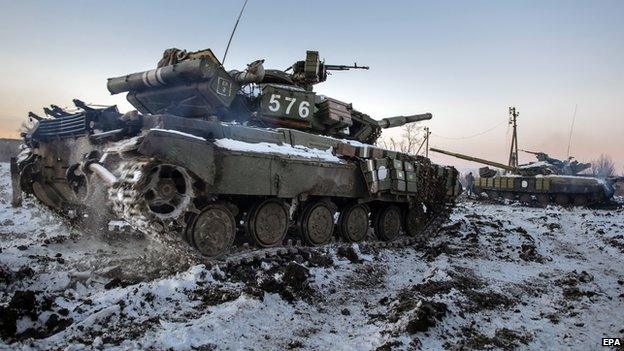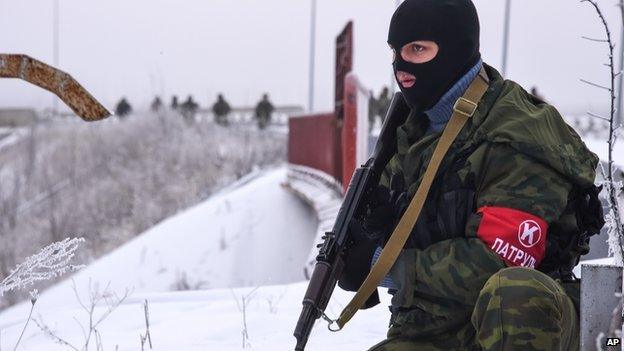'Counter Russian propaganda' MEPs tell EU
- Published

Ukrainian forces face heavily armed and well-trained rebels in the east
The European Parliament has urged the EU to counter Russian "propaganda" and said sanctions cannot be lifted until Russia stops its "aggressive and expansionist policy" towards Ukraine.
Latvia is considering an EU-backed TV service to target Russian viewers.
The MEPs' resolution coincided with heavy fighting at Donetsk airport between Ukrainian government troops and pro-Russian separatists.
Ukraine says some 8,500 Russian regular troops are helping the rebels.
Ukraine will begin a phased army conscription drive on 20 January, with an initial intake of 50,000. More than 100,000 will be drafted into the Ukrainian army this year, under the plan.
More than 4,700 people have been killed since the rebels took control of a big swathe of Donetsk and Luhansk regions in eastern Ukraine last April. Many more civilians have been displaced by the fighting.
Russia denies sending regular troops and heavy weapons there, but admits that Russian "volunteers" are helping the rebels.
On Thursday the rebels announced they had captured the shattered remains of Donetsk airport - a claim dismissed by Ukraine.

The rebels in Donetsk have close ties to the Russian military
'Hybrid war'
The MEPs' resolution, external said Russia's policy "constitutes a threat to the unity and independence of Ukraine and poses a potential threat to the EU itself, including the illegal annexation of Crimea and waging an undeclared hybrid war against Ukraine".
They accused Russia of "information war, blending elements of cyber warfare, use of regular and irregular forces, propaganda, economic pressure, energy blackmail, diplomacy and political destabilisation".
State-controlled TV dominates the media scene in Russia and accuses the Ukrainian government of waging war on Russian-speaking civilians.
A ceasefire agreed in September has been left in tatters as shelling continues, though there have been some significant prisoner swaps.
The MEPs urged the European Commission to set clear benchmarks for the existing sanctions which, if achieved by Russia, could trigger a suspension or removal of some of the restrictions.
The Commission should also "prepare and present to Parliament within two months a communication strategy to counter the Russian propaganda campaign", they said.
They called for "instruments that would allow the EU and its member states to address the propaganda campaign".
Latvia is steering EU ministerial meetings until mid-2015. Like its Baltic neighbours Estonia and Lithuania, it wants the EU to maintain pressure on Russian President Vladimir Putin. Ethnic Russians form about 40% of Latvia's population.
Earlier this month the Latvian foreign ministry said it was strongly in favour of launching a quality Russian-language TV channel, through an EU partnership. It would not consist solely of news bulletins, nor would it be "Brussels propaganda", ministry official Viktors Makarovs said. , external
Reports say the UK, Estonia, Lithuania and Denmark also support the idea of a new EU communications strategy, external targeting Russians.
